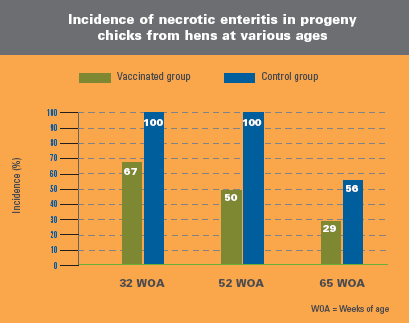
Schrader: 'Incidence of necrotic enteritis was significantly lower'
 "A toxoid is a
molecule that's still able to produce an immune response but is no longer capable of causing disease."
"A toxoid is a
molecule that's still able to produce an immune response but is no longer capable of causing disease."
DR. JOAN SCHRADER
In response to increasing consumer and
regulatory pressures to get drugs out of the
food chain, broiler companies are reducing
or even eliminating antibiotics and growth
promoters. In doing so, many are attracting
new customers willing to pay a premium for
antibiotic-free birds. But, without drugs on
board to protect their flocks, producers are
beginning to see serious economic losses
from necrotic enteritis.
At least one animal health company has
recognized the need for alternatives to
managing necrotic enteritis and has been
working feverishly to come up with an
innovative solution.
Dr. Joan S. Schrader, a research scientist
for Schering-Plough Animal Health, told
symposium attendees about a novel new vaccine specially designed to combat
necrotic enteritis in poultry. She also gave
them an overview of some of the trials
leading up to the vaccine's conditional
approval by USDA, which regulates
biological products.
The product is currently known as
Clostridium perfringens type A toxoid.
She explained that Schering-Plough
Animal Health has already met the regulatory
agency's criteria for bird, human and
environmental safety. Full license will be
granted pending the outcome of efficacy
trials, which are currently under way. In
the meantime, many producers are already
using the Clostridium perfringens type
A toxoid to manage necrotic enteritis
in broilers.
New vaccine builds on earlier work in other species
Shrader noted that Schering-Plough is
hardly a newcomer in the development of
clostridial vaccines. "The company began
manufacture of clostridial vaccines for
animals in the 1960s, so now we now
have more than 40 years of experience in
developing clostridial vaccines for cattle
and sheep," she reported.
As she sees it, the new vaccine for
poultry is just a natural extension of that
previous work.
 Figure 1.
Figure 1. Incidence of necrotic enteritis was significantly lower in all of the vaccinated groups.
Schrader, who served as the lead scientist
on the project, said that she and her
team tested numerous vaccine candidates
before coming up with a suitable formulation.
She said that clostridial disease in
poultry is caused by the alpha toxin that
is produced by Clostridium perfringens
types A and C. Type A is by far the more
common of the two, accounting for more
than 95% of NE in poultry.
"The new vaccine is made from C. perfringens
type A's alpha toxin that is inactivated
into a toxoid," she added. "A toxoid is a
molecule that's still able to produce an
immune response but is no longer capable
of causing disease."
Progeny protected by passive immunity
The NE toxoid is administered to hens at
10 to 15 weeks of age, then again at 17 to 20
weeks of age. It triggers antibody titers against the alpha toxin. Those antibodies
are then transferred to the hen's progeny
- a process known as passive immunity.
To find out how long immunity lasts in
vaccinated hens, Schrader and her team
undertook a series of studies. They
vaccinated the hens once, then followed
that with the booster a few weeks later.
Then they monitored the birds through the
onset of lay, collected eggs during the
early, mid and later portions of the laying
cycle, and tested both the sera and egg
yolks from the hens for antibody to the
alpha toxin. Results from those studies
were compared with controls.
"We had no titer in the sera of hens that
were not vaccinated, but in the vaccinated
hens, we had significantly higher titers,
both at 35 weeks of age, then again when we re-tested them at 55 weeks," she said.
"We tested egg yolks at 33 weeks of hen
age, and 78 weeks of hen age, and we had
significant titers out to 78 weeks of age."
Encouraged by those results, Schrader's
team took the next step and tested the
progeny of the hens. They set the eggs,
hatched the chicks, and then fed the young
birds a high-protein fishmeal diet designed
to irritate the gut, which can promote
necrotic enteritis. The birds were then
challenged with C. perfringens type A on 3
consecutive days—19, 20, and 21—and
then necropsied on days 22 and 23.
"We found that the incidence of necrotic
enteritis was significantly lower in all of
the vaccinated groups as compared to the
control groups," she reported. "And that
was in chicks that were hatched from
hens that were 32, 52 and 65 weeks of age.
(Figure 1)"
The researchers also compared necrotic
enteritis lesion scores for vaccinated vs.
control progeny and found that vaccinated
birds had significantly lower scores than
did controls.
Summing up her presentation, Schrader
said the NE toxoid induced a significant
antibody response in the sera of hens
administered the vaccine and that those
antibodies persisted through 78 weeks
of age. Eggs from the vaccinated hens
showed significant antibody titers through
65 weeks of age.
"We also found that that the NE toxoid
produced no tissue reactions at the
injection sites, was found safe when
used under field conditions and, most
importantly, the progeny of the hens
vaccinated with the NE toxoid were
protected from necrotic enteritis
challenge," she said.
Spring 2008
Back to North American Edition (#1)


 Figure 1. Incidence of necrotic enteritis was significantly lower in all of the vaccinated groups.
Figure 1. Incidence of necrotic enteritis was significantly lower in all of the vaccinated groups.







